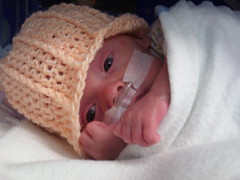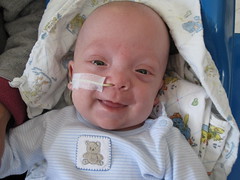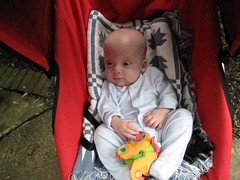We had a "family meeting" today; our first in two months. Max's entire NICU team assembled in a conference room adjacent to the critical care nursery: the attending, fellow, resident, Max's nurse and a social worker, plus maybe a couple other cast members took two hours out of their day to talk to us and answer our questions. I feel like writing a personal note of apology to all of the babies in the NICU because we sucked up so much of the NICU team's collective brainpower.
We learnt quite a bit: too much for me to detail tonight. I will hit the high points now and then write a longer description later. (If you stick around to the end of this post you'll be rewarded with a heart-warming story.) The attending began the discussion of each of Max's problems by asking us to describe our perception of the situation. The picture that Carolyn and I described seemed to accord well with the NICU team's in almost all cases, so there weren't (many) surprises.
I'll start with Max's head because I believe that, although it is not an urgent problem right now, many years from now we'll still be dealing with Max's hydrocephalus long after we've forgotten about his reflux or breathing problems. Thus, any kind of news about his hydrocephalus affects my vision of life in the science-fictional year of 2030 (when I hope to attend Max's college graduation). As we knew, Max has hydrocephalus, but his most recent MRI showed no sign of PVL. However, Dr. S. said that in addition to being swollen (the hallmark of hydrocephalus), Max's left ventricle was oddly shaped. I think that Dr. S. adduced that the ventricle may have flowed into an area of "lost brain". As I understand it, until now we'd been worried about the damage that Max's ventricles did to the surrounding brain tissue when they filled with CSF and expanded. However, Dr. S. seemed to suggest that, like a water balloon sitting on some Legos, one of Max's ventricles might be larger than normal because there was no brain tissue there to push back. This was all very confusing, and we asked several questions about it but couldn't quite nail down what had happened. Carolyn and I have decided to suspend our anxiety on this matter and consult with a neurologist next week. We also learnt that 20 percent of infants with enlarged ventricles go on to have some kind of motor or cognitive deficit.
We can't control what's going on inside Max's brain. However, I'm firmly convinced that aggressive therapy can ameliorate any damage. Dr. S. and the NICU team clearly relaxed when we said that we intended to sign Max up for the local early intervention program and follow the advice of speech/physical/occupational therapists. Years of graduate school have prepared Carolyn and me to compulsively follow any therapeutic regimen suggested by the experts. I also told the NICU team what they couldn't know: that Max's older brother is as sharp as a tack, and that his parents aren't dullards either. Hence, Max himself must be in line to inherit some grade A brains. This was the one comment I made that elicited hearty laughter from the whole NICU team. Perhaps Max's dad isn't as smart as he thought.
The NICU team told us that a recent assessment of Max's reflexes, behavior, etc put him at the same level as a normal baby aged one month. (Max is more than three months old.) I think the NICU team were afraid that this would dismay us, but Carolyn and I were thrilled by the news. Considering that for weeks and weeks of his early tenure at the NICU, Max wasn't even as responsive as a normal newborn infant, this is a huge step forward.
Dr. S. was quite upbeat about the state of Max's lungs. First, the bad news: the lungs were damaged by the use of oxygen therapy and respirators in his early weeks at the NICU, plus the normal underdevelopment of the lung of the premature infant. In addition, Max is aspirating his reflux (see below) further damaging them. The inflammation from inhaling liquids is what is causing his persistent pulmonary edema, which decreases the efficiency of his lungs.
Now the good news. The lung seems to be the one organ that NICU teams really love. It grows relatively quickly in relation to the infant's overall growth, and grows for a long time. By the time Max is two years old, the damaged portion of his lung will represent only a small fraction of his overall lung. Even if Max's reflux continues to damage his lung, it will grow its way out of trouble. The danger to Max's lung is that he aspirates a considerable quantity of milk and develops pneumonia: this could affect a significant fraction of his lung.
Finally, we spent quite a lot of time talking about Max's main problem: his reflux. Really, his reflux is the main reason Max is still in the hospital. I think they would have sent him home with a feeding tube by now. But when Max is fed he is very uncomfortable and is clearly feeling his stomach contents travelling up his esophagus. He vomits much more frequently now than ever before in his stay at the NICU. To Carolyn and me this reflux seemed to come out of nowhere. However, the NICU team told us that they've increased the volume that Max is getting. This is actually good news: despite his reflux and vomiting, Max is managing to get enough nutrition from his feeds that he is gaining weight. Indeed, in a very narrow sense, I believe that Max is actually maybe thriving. Some babies require supplemental nutrition via an IV. In addition, back during the dark days of mid-December, I remember Max's nurses describing his symptoms as consistent with reflux. Shortly after that, the NICU team pushed his feeding tube into his duodenum, where it was more or less impossible for milk to return to the stomach and then reflux back to the esophagus.
The NICU team are urging us to seriously consider a couple of linked surgical procedures. First is running a tube--called a g-tube--to Max's stomach directly from the outside world. This will allow us to feed him without using a feeding tube. If Max didn't have reflux but was just having trouble eating, a g-tube would allow us to take him home immediately. The second is called the Nissen procedure and involves, effectively, tightening the esophagus's opening into the stomach. This surgery elicits a lot of controversy on the Internet. Many parents seem to feel that their doctors suggest it as a way to get a baby to stop screaming in discomfort from reflux, but that the procedure itself doesn't actually do much. In adults, the procedure isn't that successful.
The good news is that the NICU team are very conservative and will consult closely with the pediatric surgeon. They're ordering a couple of barium studies of his esophagus to see whether there's a structural abnormality that might make Max a good candidate for a Nissen. We've gotten to know the surgeon quite well over the past few months because Max has come close to requiring his services at least twice. We like and trust him. He wasn't the least bit disappointed in the past episodes when Max got himself organized and avoided the surgeon's knife.
And now, the heart-warming story. Carolyn went out for coffee with a colleague this afternoon. When she returned, she found that Max's nurses had rigged up a system of pads to allow him to be slightly propped up but also comfortable. She had also set up a toy star with a little mirror on it just within Max's reach. Carolyn found Max happily reaching up and batting at the star. From her description, it seems like Carolyn spent some time just staring at the scene: a baby playing happily with a crib toy.
Friday, January 30, 2009
Another big family meeting
Labels:
family meeting,
headbleed,
hydrocephalus,
lungs,
physical therapist,
reflux




